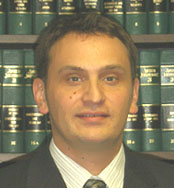

| THE SAINT PAUL PERSONAL INJURY ATTORNEY |
 |
 |
|
TORT | JURY INSTRUCTIONS - trial court discretion regrading present-valuing instructionSTATE OF MINNESOTA IN COURT OF APPEALS A05-2362 Steven C. Youngquist, Trustee for the Next of Kin of Sheryl Lynn Gasner, Appellant, vs. Western National Mutual Insurance Company, Respondent Filed June 27, 2006 Affirmed Worke, Judge Steele County District Court File No. C8-03-1557 Charles James Suk, Beth K. Bussian, Suk Law Firm, Ltd., 5 East Center Street, Suite 200, Rochester, MN 55904 (for appellant) Julian C. Janes, James T. Martin, Gislason, Martin & Varpness, P.A., 7600 Parklawn Avenue South, Suite 444, Edina, MN 55435 (for respondent) Considered and decided by Hudson, Presiding Judge; Kalitowski, Judge; and Worke, Judge. S Y L L A B U S In a wrongful-death action, it is within the discretion of the district court to instruct a jury to adjust to present cash value the loss of future aid, advice, comfort, and companionship. O P I N I O N WORKE, Judge On appeal from the district court’s denial of posttrial motions, appellant argues that the district court erred when it instructed the jury to determine the present cash value of the loss of future aid, advice, comfort, and companionship that the deceased would have provided rather than the future value of the loss. Because the district court did not materially misstate the law in its instruction to the jury and the instruction was an appropriate exercise of the district court’s discretion, we affirm. FACTS Frank Gasner and Herman Eaker were involved in a two-car accident. Sheryl Gasner, a passenger in her husband’s vehicle, died as a result of the accident. Eaker was insured under a policy that had a liability limit of 0,000 and a ,000,000 umbrella policy. Sheryl Gasner was insured under an automobile-insurance policy issued by respondent Western National Mutual Insurance Company. Sheryl Gasner’s policy provided underinsured-motorist coverage in the amount of 0,000 per person and 0,000 per accident. Appellant Steven C. Youngquist, trustee for the next of kin of Sheryl Lynn Gasner, settled the claim against Eaker for 0,000. Appellant settled the claim against Frank Gasner for ,000. Appellant then asserted that Eaker had been operating an underinsured vehicle and made a claim for underinsured-motorist benefits. Respondent did not pay appellant underinsured-motorist benefits, asserting that ,100,000 in coverage was available under Eaker’s liability-insurance policies. Appellant filed an underinsured-motorist claim against respondent. The parties disagreed regarding whether the jury should be instructed to adjust an award for the loss of future aid, advice, comfort, and companionship to present cash value. The district court reviewed the jury-instruction guides and spoke to the judicial-advisory service and determined that compensation for loss of future aid, advice, comfort, and companionship should be reduced to present cash value. In determining the amount of future damages, over appellant’s objection, the district court gave the jury the following instruction: After finding the dollar value of future damages for: a. Loss of future earnings and services b. Loss of future aid, advice, comfort, and companionship you must then find the present cash value of this amount, and award only the present cash value. This is called “adjusting,” and is based on inflation and the fact that invested money earns interest. The jury found that Eaker’s negligence was a direct cause of the accident. The jury determined that (1) ,762.69 for funeral expenses; (2) 5,000 for loss of financial support from the date of her death to the present date; (3) 0,000 for aid, comfort, advice, and companionship she would have given from the date of her death to the present date; (4) 0,000 for loss of future financial support; and (5) 0,000 for future aid, comfort, and advice would fairly and adequately compensate Sheryl Gasner’s next of kin. Based on the jury’s verdict, the district court concluded that the total damages for the pecuniary loss suffered by Sheryl Gasner’s next of kin was 5,000, and based on that award, Eaker was not an underinsured motorist. The district court dismissed all claims against respondent with prejudice. Appellant moved for amended findings and for a new trial based on the district court’s instruction to the jury to reduce to present cash value the loss of future aid, advice, comfort, and companionship. The district court denied appellant’s motion for a new trial, and this appeal follows. ISSUE Did the district court abuse its discretion by instructing the jury to award the present cash value of damages for loss of future aid, advice, comfort, and companionship? ANALYSIS Denying a motion for a new trial on the ground of erroneous jury instruction rests within the district court’s discretion, and we will not reverse absent a clear abuse of that discretion. Paulson v. Lapa, Inc., 450 N.W.2d 374, 378 (Minn. App. 1990), review denied (Minn. Mar. 22, 1990). District courts generally have “considerable latitude” in choosing jury instructions. Morlock v. St. Paul Guardian Ins. Co., 650 N.W.2d 154, 159 (Minn. 2002). But a court errs if it gives a jury instruction that materially misstates the law. State v. Kuhnau, 622 N.W.2d 552, 556 (Minn. 2001). If an erroneous jury instruction destroys the substantial correctness of the charge, causes a miscarriage of justice, or results in substantial prejudice, a new trial is warranted. Lindstrom v. Yellow Taxi Co., 298 Minn. 224, 229, 214 N.W.2d 672, 676 (1974). An error is prejudicial if there is a “reasonable likelihood that the giving of the instruction in question would have had a significant effect on the verdict of the jury.” State v. Glidden, 455 N.W.2d 744, 747 (Minn. 1990). If a jury instruction “is erroneous and an appellate court is unable to determine whether the error affected the jury, a new trial should be granted.” Rowe v. Munye, 674 N.W.2d 761, 769 (Minn. App. 2004), aff’d, 702 N.W.2d 729 (Minn. 2005). Appellant argues that the district court erred in instructing the jury that the loss of future aid, advice, comfort, and companionship—a particular measure of pecuniary damage in a wrongful-death matter—is susceptible to reduction to present cash value. Under Minn. Stat. § 573.02, subd. 1 (2004), recovery in a wrongful-death action “is the amount the jury deems fair and just in reference to the pecuniary loss resulting from the death[.]” The supreme court expanded the concept of “pecuniary loss” to include loss of aid, advice, comfort, and protection. Fussner v. Andert, 261 Minn. 347, 358, 113 N.W.2d 355, 362 (1962). CIVJIG 91.75 states that a jury must “determine an amount of money that will fairly and adequately compensate (claimant)(s) for the losses . . . suffered as a result of [the] death.” 4A Minnesota Practice, CIVJIG 91.75 (1999). There are 12 factors for a jury to consider in determining a fair amount: (1) past contributions, (2) life expectancy at the time of death, (3) health, age, habits, talents, and success, (4) occupation, (5) past earnings, (6) likely future earning capacity and prospects of bettering oneself had he or she lived, (7) living expenses, (8) legal obligation to support spouse or next of kin and the likelihood of fulfilling that obligation, (9) reasonable funeral and necessary medical expenses, (10) probability of paying off existing debts, (11) future counsel, guidance, and aid, and (12) future advice, comfort, assistance, and protection. Id. While some future damages are to be adjusted to present day value, others are not. CIVJIG 90.25 provides instructions for adjusting future damages to present cash value. 4A Minnesota Practice, CIVJIG 90.25 (1999). This instruction provides that damages for loss/reduction of future earning capacity and for future health-care expenses must be adjusted. Id. Damages that are not to be adjusted include (1) future pain, (2) future disability, (3) future emotional distress, and (4) past damages. Id. “In 1985, the legislature enacted a discount statute, [Minn. Stat.] § 604.70. That statute was repealed in 1988, making the discount issue once again subject to judicial decision.” Id. at use note. Appellant argues that damages for future aid, advice, comfort, and companionship should not be adjusted to present cash value because an award for these damages is equivalent to an award for future pain and suffering, which is not adjusted. Appellant contends that this type of damage award, like an award for future pain and suffering, is a means to compensate the next of kin for their loss, rather than a means of meeting their expenses. Respondent argues that the district court did not abuse its discretion because the district court’s instruction was not a material misstatement of the law. The district court instructed the jury to adjust the damage award for future aid, advice, comfort, and companionship to present cash value. The district court reasoned that these items were the same as “services.” The district court correctly characterized this loss as a service that will have to be provided by someone else after a death. See e.g. Bolinger v. St. Paul & D. R. Co., 36 Minn. 418, 420, 31 N.W. 856, 857 (1887) (stating that the value of the services of the head of a family cannot be limited to the amount of wages and that daily services, attention, and care may be considered by the jury). Additionally, CIVJIG 90.25 provides a list of damages that are not to be adjusted. The loss of future aid, advice, comfort, and companionship does not fall into any of the excluded categories—future pain, future disability, future emotional distress, and past damages. Most persuasive is the use note to CIVJIG 90.25 that indicates that the issue of discounting an award is subject to judicial decision. The district court did not materially misstate the law in its instruction. See Kuhnau, 622 N.W.2d at 556 (stating that a district court errs when it gives a jury instruction that materially misstates the law). Thus, the district court did not abuse its discretion in denying appellant’s motion for a new trial because it was within the district court’s discretion to instruct the jury to adjust the loss of future aid, advice, comfort, and companionship to present cash value. D E C I S I O N Because the district court’s jury instruction to adjust the loss of future aid, advice, comfort, and companionship to present cash value was not a material misstatement of the law and was within the district court’s discretion, the district court did not abuse its discretion by denying appellant’s motion for a new trial based on an erroneous jury instruction. Affirmed. |
|||||||||||||||||||||||||||||||||||||||||||||||||||||||||||||||||||||||
| By visiting this page or clicking the "submit" button above, you agree that you have read and accept this "disclaimer". |
||||||||||||||||||||||||||||||||||||||||||||||||||||||||||||||||||||||||
| Copyright ©
Michael E. Douglas, Attorney at Law, Saint Paul MN. All Rights
Reserved. Minnesota Lawyer representing Personal Injury, Car / Auto Accident, Workers Compensation, Medical Malpractice, Social Security Disability claims. Dedicated to Injured Workers, Victims of Negligence, Car Accidents, Victims of Fraud, and those in need of legal assistance. |